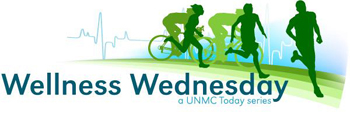 Much has been made in recent years about the various drugs, gums and patches that help people kick tobacco.
Much has been made in recent years about the various drugs, gums and patches that help people kick tobacco.
And while these products have been effective for many people, UNMC pharmacist and smoking cessation expert Tom Klingemann, Pharm.D., said they typically work best when combined with some form of counseling or support group treatment.
|
In fact, he said, when drug companies test these products for their effectiveness, they typically have the subjects go through a comprehensive counseling regimen in combination with the cessation drug.
The makers of Chantix — a drug that has helped many people kick the habit — actually instructs those who use it to combine the use of the drug with counseling or some other treatment method to deal with the psychological aspects of their addiction.
A comprehensive, holistic approach to quitting that accounts for the physical and psychological aspects of tobacco addiction is likely to be more successful than a quit attempt powered strictly by drugs, Dr. Klingemann said.
“These drugs can be powerful tools to those who wish to quit but they aren’t the end-all, be all,” Dr. Klingemann said. “Unfortunately we live in a society where people want a quick fix. They want to take a pill and be done with it.
“But many have found that when it comes to tobacco addiction, the pill or the gum is not enough.”
|
The three, one-hour classes are available for a total fee of $15.
Please pre-register through Jayme Nekuda, Ph.D., at 559-8962 or jnekuda@unmc.edu if you wish to attend this session.
Cessation resources
Did you know the Caremark Prescription Drug Program includes reimbursement for tobacco cessation drugs such as:
- Buproprion;
- Zyban;
- Chantix;
- Nictotine gum;
- Nicotrol inhaler; and
- Nicoderm patch?
A 30-day supply of the above drugs based on the brand non-formulary co-pay ($47) except for Bupropion, which is a generic drug ($9 co-pay).
These co-pays can be submitted to the Health Care Reimbursement account if you participate in that benefit.
An annual $50 deductible also is required for brand name drugs for each covered person.